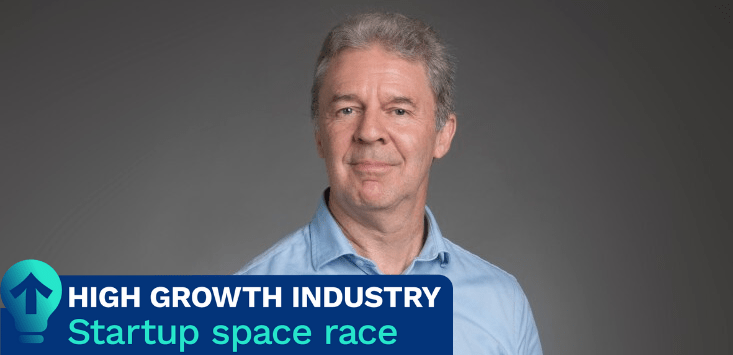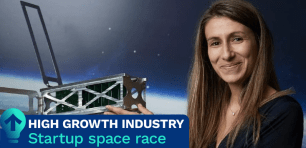
Main Ventures partner Martin Duursma. Source: supplied.
Martin Duursma is a partner at Main Sequence, the deep-tech VC fund born out of CSIRO, and heads up the space tech portfolio.
To ‘bridge the gap to space’ is one of the challenges Main Sequence is striving to address, and in doing so it has invested in Quasar, Myriota, Advanced Navigation and Gilmour Space, just for starters.
Clearly, Durrsma sees opportunity in Aussie space tech, and he’s putting his money where his mouth is.
In 2021, the commercial space sector is at something of a turning point.
In July, within days of each other, both Richard Branson and Jeff Bezos travelled to the edge of space and back, driving visibility of this sector on a global scale.
For the first time perhaps in decades, space is a regular topic of conversation in the mainstream media — and they’re talking about private ventures.
“We’re at this very interesting transition in the space industry,” Duursma tells SmartCompany Plus.
“Previously it was the domain of governments — the government typically was the customer.”
We’re looking at an era of “space 2.0”, and seeing a rise in space companies operating for commercial profit. And while space tourism is the sector that gets all the headlines, there are also whole industries emerging around microsatellites, takeoff and landing facilities, commercial rocket launches and space-centric software.
For an investor, it’s a goldmine just waiting to be tapped.
While apologising for the accidental pun, Duursma says Main Sequence views space as a “sunrise industry”.
That is, the team sees a huge opportunity for new businesses emerging both in space tech and in the supply chains and ecosystem around it.
An Aussie endeavour
Perhaps unexpectedly, all of this is especially true in Australia.
Australia was one of the first countries to launch a satellite into space from its home soil, back in the 50s, Dursma says.
The sector has been largely dormant since then, but we’ve been a “huge consumer” of space technology from overseas, using it for things like observation and navigation in very remote areas.
“Why not develop some of that as sovereign capability?”
We’re hearing a lot about the space industry now, as businesses secure significant capital, but these founders have been plugging away for years, creating a sector where there wasn’t really one before.
Aussie founders come at the challenge with “a slightly different attitude”, Duursma suggests.
We haven’t historically seen a lot of government spending in this area, compared to the US for example, where NASA programs often involve outsourcing to specialist tech providers.
Currently, the Australian Space Agency acts as more of a regulatory oversight body, and it not at that stage just yet.
“By design, I think it means that our Australian space startups are looking at other ways to bring themselves up,” he explains.
They’re hungry, they’re internationally focused and export-oriented, and they’re actively looking for commercial opportunities.
They don’t have the legacy of “the ways things have always been done”, Duursma notes.
“It’s a bit of a clean sheet, I suppose.”
What makes space success?
From a VC perspective, getting in the ground floor of the spacetech boom could clearly pay off. But what about the risks?
Duursma agrees that businesses focused on rocket technology and other hardware require an awful lot of capital before they start making revenues. These are not the kind of startups that can build an MVP, release it to the world and iterate as they go.
But there are software businesses in the ecosystem, facilitating the hardware ventures — the thing is, it can take a while for their customers to be ready for them.
What Main Sequence is looking for is potential. When they invested in Gilmour Space, for example, there was clear data to show that if it could achieve a certain scale, it would be a billion-dollar company.
For some companies it’s clear that “if they’re successful, we know they’ll be very valuable”, he notes.
Having raised $61 million a matter of weeks ago, Gilmour certainly looks to be on its way.
Others, like Main Sequence portfolio company Myriota, might be building a product that is globally scalable in a way that could one see it bringing in “many hundreds of millions” in value.
“Is it a big enough opportunity that a venture-style investor like us could invest in, that can drive a billion dollar outcome?”
Shooting for the stars
This is a sector that has come a long way within just the past five years. So what does Duursma expect to see within the next five?
As an investor, after all, he is in the business of reading what’s written in the stars, so to speak.
If we have this conversation again in 2026, he imagines we’ll be talking about communications and a revolution in the internet. Satellite constellations will soon allow for “truly universal internet coverage from anywhere on the planet”, he notes.
“That’s an enabler that, we just don’t even know what that’s going to drive around the world.”
This will also fuel further growth in the IoT sector, he says.
In terms of the rocket sector, he predicts we will see several successful launch companies emerging that will further reduce barriers to space for other businesses.
Overall, he says it will be easier for new innovations to come to market.
In Australia, the space industry is “absolutely” something that will contribute to the economy, Duursma adds.
Jobs in the sector require advanced engineering, manufacturing skills, he notes. While currently a lot of talent is coming from overseas, we have “some of the best engineering schools” in Australia, he says.
So we have an up-and-coming talent pool, locally. The more limelight space startups receive, the more they’re going to look attractive to new graduates as a viable career path.
All in all, there’s a lot of potential here, but the space tech industry is still in its infancy.
They may be attracting big chunks of capital, but the Aussie startups are still in scale-up mode. The next level will be securing government contracts, Duursma says.
“There are a number of significant defence contracts that have space components to them coming up in the next number of years,” he notes.
“As our local industry starts to scale up, the hope I have is that a number of our Australia local space companies will be able to successfully bid for some of those contracts.”
Handpicked for you

Community is key in Aussie space tech success, says Fleet’s Flavia Tata Nardini



COMMENTS
SmartCompany is committed to hosting lively discussions. Help us keep the conversation useful, interesting and welcoming. We aim to publish comments quickly in the interest of promoting robust conversation, but we’re a small team and we deploy filters to protect against legal risk. Occasionally your comment may be held up while it is being reviewed, but we’re working as fast as we can to keep the conversation rolling.
The SmartCompany comment section is members-only content. Please subscribe to leave a comment.
The SmartCompany comment section is members-only content. Please login to leave a comment.